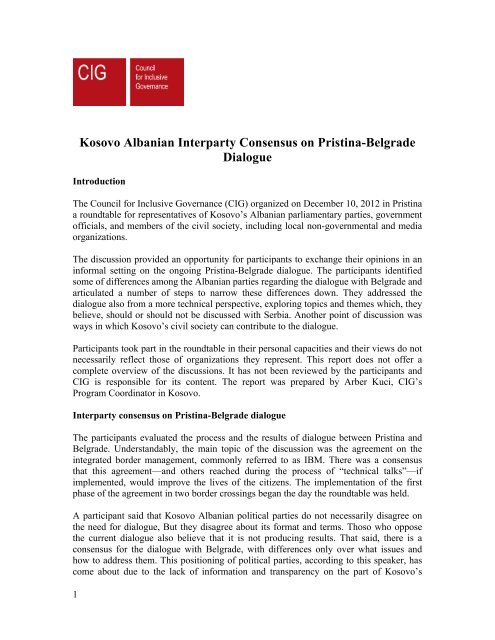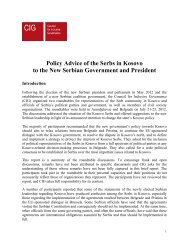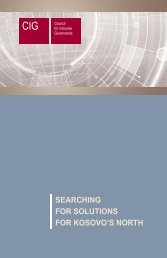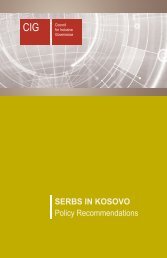Kosovo Albanian Interparty Consensus on Pristina-Belgrade Dialogue
Kosovo Albanian Interparty Consensus on Pristina-Belgrade Dialogue
Kosovo Albanian Interparty Consensus on Pristina-Belgrade Dialogue
Create successful ePaper yourself
Turn your PDF publications into a flip-book with our unique Google optimized e-Paper software.
1<br />
<str<strong>on</strong>g>Kosovo</str<strong>on</strong>g> <str<strong>on</strong>g>Albanian</str<strong>on</strong>g> <str<strong>on</strong>g>Interparty</str<strong>on</strong>g> <str<strong>on</strong>g>C<strong>on</strong>sensus</str<strong>on</strong>g> <strong>on</strong> <strong>Pristina</strong>-<strong>Belgrade</strong><br />
<strong>Dialogue</strong><br />
Introducti<strong>on</strong><br />
The Council for Inclusive Governance (CIG) organized <strong>on</strong> December 10, 2012 in <strong>Pristina</strong><br />
a roundtable for representatives of <str<strong>on</strong>g>Kosovo</str<strong>on</strong>g>’s <str<strong>on</strong>g>Albanian</str<strong>on</strong>g> parliamentary parties, government<br />
officials, and members of the civil society, including local n<strong>on</strong>-governmental and media<br />
organizati<strong>on</strong>s.<br />
The discussi<strong>on</strong> provided an opportunity for participants to exchange their opini<strong>on</strong>s in an<br />
informal setting <strong>on</strong> the <strong>on</strong>going <strong>Pristina</strong>-<strong>Belgrade</strong> dialogue. The participants identified<br />
some of differences am<strong>on</strong>g the <str<strong>on</strong>g>Albanian</str<strong>on</strong>g> parties regarding the dialogue with <strong>Belgrade</strong> and<br />
articulated a number of steps to narrow these differences down. They addressed the<br />
dialogue also from a more technical perspective, exploring topics and themes which, they<br />
believe, should or should not be discussed with Serbia. Another point of discussi<strong>on</strong> was<br />
ways in which <str<strong>on</strong>g>Kosovo</str<strong>on</strong>g>’s civil society can c<strong>on</strong>tribute to the dialogue.<br />
Participants took part in the roundtable in their pers<strong>on</strong>al capacities and their views do not<br />
necessarily reflect those of organizati<strong>on</strong>s they represent. This report does not offer a<br />
complete overview of the discussi<strong>on</strong>s. It has not been reviewed by the participants and<br />
CIG is resp<strong>on</strong>sible for its c<strong>on</strong>tent. The report was prepared by Arber Kuci, CIG’s<br />
Program Coordinator in <str<strong>on</strong>g>Kosovo</str<strong>on</strong>g>.<br />
<str<strong>on</strong>g>Interparty</str<strong>on</strong>g> c<strong>on</strong>sensus <strong>on</strong> <strong>Pristina</strong>-<strong>Belgrade</strong> dialogue<br />
The participants evaluated the process and the results of dialogue between <strong>Pristina</strong> and<br />
<strong>Belgrade</strong>. Understandably, the main topic of the discussi<strong>on</strong> was the agreement <strong>on</strong> the<br />
integrated border management, comm<strong>on</strong>ly referred to as IBM. There was a c<strong>on</strong>sensus<br />
that this agreement—and others reached during the process of “technical talks”—if<br />
implemented, would improve the lives of the citizens. The implementati<strong>on</strong> of the first<br />
phase of the agreement in two border crossings began the day the roundtable was held.<br />
A participant said that <str<strong>on</strong>g>Kosovo</str<strong>on</strong>g> <str<strong>on</strong>g>Albanian</str<strong>on</strong>g> political parties do not necessarily disagree <strong>on</strong><br />
the need for dialogue, But they disagree about its format and terms. Thoso who oppose<br />
the current dialogue also believe that it is not producing results. That said, there is a<br />
c<strong>on</strong>sensus for the dialogue with <strong>Belgrade</strong>, with differences <strong>on</strong>ly over what issues and<br />
how to address them. This positi<strong>on</strong>ing of political parties, according to this speaker, has<br />
come about due to the lack of informati<strong>on</strong> and transparency <strong>on</strong> the part of <str<strong>on</strong>g>Kosovo</str<strong>on</strong>g>’s
government. So far, the government has not explained in what capacities do <str<strong>on</strong>g>Kosovo</str<strong>on</strong>g> and<br />
Serbia take part in the dialogue; is it a process between individuals or between states?<br />
The participant also stressed the fact that no debate took place prior to the initiati<strong>on</strong> of<br />
this process and, as a result, many within the political spectrum feel ignored or eliminated<br />
from the process. The IBM agreement, as this participant stressed, adds more to this haze<br />
and makes the whole process even less transparent. He justified those who questi<strong>on</strong> the<br />
need for such an agreement, noting that <str<strong>on</strong>g>Kosovo</str<strong>on</strong>g>’s borders were recognized by<br />
Yugoslavia, the Republic of Serbia, the UNSC Resoluti<strong>on</strong> 1244, the Ahtisaari Plan, and<br />
<str<strong>on</strong>g>Kosovo</str<strong>on</strong>g>’s C<strong>on</strong>stituti<strong>on</strong>. “What is IBM? Just a crossing point or a border crossing? It is<br />
neither, and there is much ambiguity in how it is being interpreted,” said this participant,<br />
adding that such a process can be anything but genuine for normalizing relati<strong>on</strong>s, an<br />
overall objective of the dialogue sp<strong>on</strong>sored by the EU. “We need to decrease ambiguity,”<br />
c<strong>on</strong>cluded the participant.<br />
Other participants agreed that talking about a c<strong>on</strong>sensus under the current circumstances<br />
is somewhat of a stretch. One of them took the discussi<strong>on</strong> a step further, saying that “we<br />
should also discuss whether a c<strong>on</strong>sensus is needed rather than just whether it is<br />
achievable.” Judging by how the process has been c<strong>on</strong>ducted so far, no unity or comm<strong>on</strong><br />
platform is expected to be reached am<strong>on</strong>g <str<strong>on</strong>g>Kosovo</str<strong>on</strong>g> political parties, mostly because no<br />
government wants to share with oppositi<strong>on</strong> parties the credit from the dialogue. “The<br />
dialogue will sustain the current politicians in power,” he said.<br />
But governments in <strong>Pristina</strong> and in <strong>Belgrade</strong> are facing challenges in managing the<br />
process in the eyes of their voters and general publics. In <str<strong>on</strong>g>Kosovo</str<strong>on</strong>g>, the government has<br />
been able to shake the ground beneath what <strong>on</strong>ce seemed a firm and steady oppositi<strong>on</strong><br />
against the dialogue. The oppositi<strong>on</strong> parties are in effect not against the dialogue but<br />
against its format. They argue that <str<strong>on</strong>g>Kosovo</str<strong>on</strong>g> is not represented as an independent state and<br />
that it has, so far, made compromises that undermine its sovereignty and provide more<br />
benefits for <strong>Belgrade</strong> than for <strong>Pristina</strong>. One of the participants agreed that <str<strong>on</strong>g>Kosovo</str<strong>on</strong>g> has not<br />
benefited much from the dialogue and that <strong>Pristina</strong> c<strong>on</strong>tinues to rely heavily <strong>on</strong> the<br />
internati<strong>on</strong>al community. “The past ten years were in favor of <str<strong>on</strong>g>Kosovo</str<strong>on</strong>g>, now the tide has<br />
shifted in favor of Serbia,” he said, adding that Serbia might get the date for the EU<br />
accessi<strong>on</strong> talks “without doing much.”<br />
A number of participants believed that the benefits, such as free movement of people and<br />
goods and services, from a swift and full implementati<strong>on</strong> of the agreements would absorb<br />
the disc<strong>on</strong>tent of the oppositi<strong>on</strong> parties in <str<strong>on</strong>g>Kosovo</str<strong>on</strong>g> and Serbia.. A possible repercussi<strong>on</strong><br />
could be the negative recepti<strong>on</strong> by Serbs in the north. Participants were optimistic that<br />
even in such a scenario, the dialogue would not be damaged or seriously threatened.<br />
<str<strong>on</strong>g>Kosovo</str<strong>on</strong>g>’s government, many participants argued, has been incapable of forming a<br />
supportive public opini<strong>on</strong> for the dialogue. The main argument in favor of the dialogue<br />
presented to the public was that it helps <str<strong>on</strong>g>Kosovo</str<strong>on</strong>g> to get closer to EU membership. If<br />
<str<strong>on</strong>g>Kosovo</str<strong>on</strong>g> engaged in this process, the argument runs, it would get closer to European<br />
integrati<strong>on</strong> and, in the l<strong>on</strong>g term, receive recogniti<strong>on</strong> by <strong>Belgrade</strong>. Other participants<br />
argued that these are largely intangible results and the public in <str<strong>on</strong>g>Kosovo</str<strong>on</strong>g> is aware that<br />
2
these are l<strong>on</strong>g-term goals are to be reached not through the dialogue but by addressing a<br />
l<strong>on</strong>g list of important issues that negatively affect the functi<strong>on</strong>ality of the state.<br />
Another participant said that the dialogue is being used by the government in order to<br />
postp<strong>on</strong>e dealing with more important and harder issues, including unemployment,<br />
corrupti<strong>on</strong>, ec<strong>on</strong>omic development and electoral theft. But even government’s claims that<br />
through dialogue Serbia will eventually recognize <str<strong>on</strong>g>Kosovo</str<strong>on</strong>g> independence are c<strong>on</strong>trary to<br />
the real situati<strong>on</strong>. According to this speaker, the removal of the sign “Welcome to<br />
<str<strong>on</strong>g>Kosovo</str<strong>on</strong>g>” in <strong>on</strong>e of the border crossing points as part of the IBM agreement means that<br />
this dialogue recognizes Serbia’s right not to recognize <str<strong>on</strong>g>Kosovo</str<strong>on</strong>g>’s statehood. Moreover,<br />
he argued, the internati<strong>on</strong>al community is not interested to dismantle Serbia’s parallel<br />
structures in the north, but rather transform them into legally accepted instituti<strong>on</strong>s. This<br />
would ensure a certain amount of aut<strong>on</strong>omy for the north, which both <str<strong>on</strong>g>Kosovo</str<strong>on</strong>g> and Serbia<br />
would accept and which would make it possible for Serbia to succeed <strong>on</strong> its EU<br />
integrati<strong>on</strong> path. So, in essence, this participant said, this is not a genuine process for the<br />
normalizati<strong>on</strong> of the relati<strong>on</strong>s between two countries. This is also the fault of <str<strong>on</strong>g>Kosovo</str<strong>on</strong>g>’s<br />
government which has not been able to discuss with other stakeholders <str<strong>on</strong>g>Kosovo</str<strong>on</strong>g>’s nati<strong>on</strong>al<br />
interests and come up with a platform of its own up<strong>on</strong> which the dialogue would be<br />
based. “We never talk about how can we help Brussels help us,” he c<strong>on</strong>cluded.<br />
One of the participants said that <str<strong>on</strong>g>Kosovo</str<strong>on</strong>g> should not engage at all in this dialogue for as<br />
l<strong>on</strong>g as Serbia does not apologize for the crimes it committed during the war in <str<strong>on</strong>g>Kosovo</str<strong>on</strong>g>.<br />
According to this speaker, Serbia should also return all the stolen properties from <str<strong>on</strong>g>Kosovo</str<strong>on</strong>g><br />
and ultimately respect <str<strong>on</strong>g>Kosovo</str<strong>on</strong>g>’s statehood. Another participant agreed, saying that the<br />
registry books which were stolen during the 1999 war should be returned to <str<strong>on</strong>g>Kosovo</str<strong>on</strong>g> as an<br />
act of good will. “No negotiati<strong>on</strong>s should be held about the registry books, they bel<strong>on</strong>g to<br />
<str<strong>on</strong>g>Kosovo</str<strong>on</strong>g>,” he argued. Another participant took this point <strong>on</strong>e step further, recommending<br />
that Serbia removes the menti<strong>on</strong>ing of <str<strong>on</strong>g>Kosovo</str<strong>on</strong>g> as part of its territory from the preamble<br />
of its c<strong>on</strong>stituti<strong>on</strong>. Another participant, however, argued that these approaches, however<br />
desirable, should take into c<strong>on</strong>siderati<strong>on</strong> the involvement of two major internati<strong>on</strong>al<br />
factors, namely the EU and the US. He noted that their c<strong>on</strong>tributi<strong>on</strong> to the process should<br />
not go unnoticed and that their engagement should by no means be taken for granted.<br />
Rather than addressing this issue through the dialogue, some participants said that the<br />
issue of the north is ultimately related to rule of law. Some argued that just like in the rest<br />
of <str<strong>on</strong>g>Kosovo</str<strong>on</strong>g>, the north is pr<strong>on</strong>e to c<strong>on</strong>tinuous criminal activities and criminal networks<br />
which should be addressed through coercive instruments. A functi<strong>on</strong>ing judiciary was<br />
menti<strong>on</strong>ed by most of the participants as the core instituti<strong>on</strong> to be revitalized. In relati<strong>on</strong><br />
to the rule of law, <strong>on</strong>e of the participants expressed his skepticism about <str<strong>on</strong>g>Kosovo</str<strong>on</strong>g>’s<br />
politicians and leaders. According to him, even if the dialogue was a good process, the<br />
individuals who represent <str<strong>on</strong>g>Kosovo</str<strong>on</strong>g> in it are not to be trusted. “They can be blackmailed<br />
because of their deeds,” he said.<br />
3
C<strong>on</strong>clusi<strong>on</strong>s<br />
There was a general agreement that the implementati<strong>on</strong> of the agreements reached so far<br />
will show whether the dialogue is a true instrument for eliminating ec<strong>on</strong>omic and<br />
political barriers between <str<strong>on</strong>g>Kosovo</str<strong>on</strong>g> and Serbia. The IBM agreement has begun to be<br />
implemented and, until now, it has been executed in two border crossings. Participants<br />
agreed that the agreement makes partiti<strong>on</strong> less likely, but it does not exclude other<br />
opti<strong>on</strong>s such as aut<strong>on</strong>omy for the north.<br />
<str<strong>on</strong>g>Kosovo</str<strong>on</strong>g>’s government has been incapable of forming a public opini<strong>on</strong> in support of the<br />
dialogue, although it has managed to sway in its favor some oppositi<strong>on</strong> parties, which, up<br />
until recently, were staunch opp<strong>on</strong>ents of the dialogue. Due to the active involvement of<br />
the EU and the US in the process, there is a general agreement am<strong>on</strong>g the participants<br />
that the dialogue is a fact, and that it is somewhat unrealistic to expect it to stop short of<br />
discussing the l<strong>on</strong>g overdue issue of the north. Instead of focusing <strong>on</strong> whether it is<br />
necessary or in <str<strong>on</strong>g>Kosovo</str<strong>on</strong>g>’s benefit, the majority of participants suggested, <str<strong>on</strong>g>Kosovo</str<strong>on</strong>g> should<br />
focus <strong>on</strong> improving the process so that it ultimately brings about tangible and measurable<br />
results.<br />
4
List of Participants<br />
Agr<strong>on</strong> Bajrami, Koha Ditore<br />
Ardian Gjini, Alliance for the Future of <str<strong>on</strong>g>Kosovo</str<strong>on</strong>g><br />
Dukagjin Gorani, Government of <str<strong>on</strong>g>Kosovo</str<strong>on</strong>g><br />
Aubrey Hamilt<strong>on</strong>, Group for Legal and Political Studies<br />
Hydajet Hyseni, Democratic Party of <str<strong>on</strong>g>Kosovo</str<strong>on</strong>g><br />
Le<strong>on</strong> Malazogu, Democracy for Development Institute<br />
Engjellushe Morina, <str<strong>on</strong>g>Kosovo</str<strong>on</strong>g> Foundati<strong>on</strong> for Open Society<br />
Shkamb Qavdarbasha, Institute for Development Policy<br />
Naim Rashiti, Internati<strong>on</strong>al Crisis Group<br />
Besa Shahini, European Stability Initiative<br />
Nexhmedin Spahiu, TV Mitrovica<br />
Xhelal Svecla, Self-Determinati<strong>on</strong> Movement<br />
Azem Vllasi, Analyst<br />
Shpetim Gashi, Council for Inclusive Govenance<br />
Alex Grigorev, Council for Inclusive Govenance<br />
Arber Kuci, Council for Inclusive Govenance<br />
Krystyna Marty, Swiss Federal Deaprtment of Foreign Affairs<br />
Norbert Ruetsche, Swiss Federal Deaprtment of Foreign Affairs<br />
5





